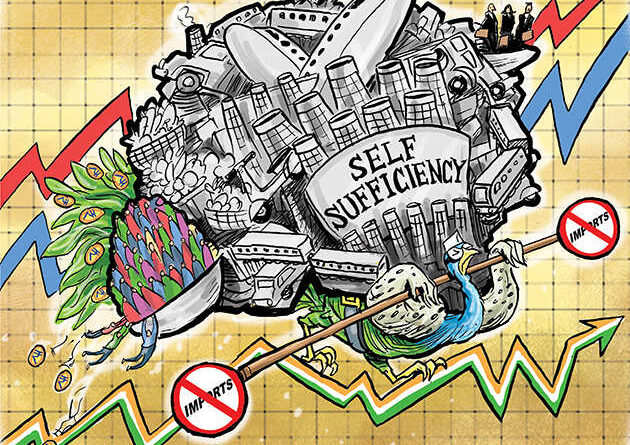Trump Sparks Self-reliance Revolution in India with Bold Tariffs
On the eve of Navratri, September 21, 2025, India’s Prime Minister, Narendra Modi, came forward to address his nation with an important message. Commemorating the day when the much-anticipated GST rate cuts will come into effect, Modi seized this pivotal moment to make a significant declaration.
In his public proclamation, Modi passionately encouraged Indians to reject foreign-produced items and instead endorse locally manufactured ones. His call for this self-reliant stance came at a strategic moment when trade tensions with the United States had seen a sudden sharp hike.
Though following President Donald Trump’s actions of enforcing a 50% tariff on Indian imports might seem severe to some, it merely appears to be an assertive attempt to safeguard American interests. Trump’s decision merely fuels Modi’s drive to popularize the ‘Swadeshi’, or ‘Made-in-India’, movement, aiming to enhance India’s self-sufficiency and economic independence.
Discerning Indians have begun campaigns to favor locally-manufactured brands over big American names like McDonald’s, Pepsi, and Apple. These brands have enjoyed significant popularity in India’s rampant consumer market, but Modi’s true Indians stand ready to support his vision by favoring local products.
Modi poignantly stated in his address, ‘A host of products that we use daily are foreign-made…It is time we move past them’. His plea brilliantly ties into the due implementation of the widely-anticipated consumer tax cuts coming into play on Monday.
Modi’s push for a more self-reliant India comes with a call to action, ‘We must support products manufactured in India,’ he asserts. His campaign is a smart move, promoting local consumption without explicitly mentioning any specific country.
Blessed with a massive population of 1.4 billion individuals, India presents a popular market destination for American consumer goods. However, through Modi’s strategic maneuver, he aims to reorient this colossal market towards endorsing locally-produced goods, thus empowering the Indian economy.
Over time, American brands have sprawled and found an extensive foothold in India’s small towns. But today, Modi appeals to local retailers to focus on selling Made-in-India products, arguing that this action could act as a considerable impetus to the nation’s economic growth patterns.
In the recent past, several corporates have buoyed their promotional activities for local commodities, mirroring Modi’s vision of a more independent India. This trend seems likely to continue with the Prime Minister’s renewed appeal for local consumption.
India’s Commerce Minister, Piyush Goyal, is poised to take a bold step forward and visit Washington for critical trade discussions. The impending visit comes amid the country’s endeavours to mend its strained bilateral trade relations, in the light of recent events.
Modi’s call for a more self-reliant India resonates with the citizens of the nation. Reflecting the sentiment of unity and self-sufficiency, there is hope for a strengthened bond between the two countries. Both nations working towards a symbiotic and prosperous future seems imminent.
While some may perceive the measures taken by the Trump administration as hard-line, they highlight the President’s commitment to prioritize US industries over foreign competition. His assertive stance holds up a mirror to nations like India, evoking introspection and stimulating a move towards self-reliance.
This noteworthy exchange between the two countries is more than just trade and tariffs; it symbolizes a shift in global perspectives towards local consumption. In the grand scheme, it may very well stimulate worldwide economic independence, led by nations like the US and India.
Both Trump’s and Modi’s decisions appeal to their national interests first and foremost. Acknowledging this, it is clear that these leaders are acting out of a sense of duty to protect their respective economies, their people’s livelihoods and, ultimately, their nations.
In conclusion, September 21, 2025, stands as a landmark day in the annals of Indian history. Narendra Modi’s address, with the backdrop of the GST cut, advocates for the adoption of more locally-produced products, stimulating the undercurrents of a self-reliant and independent India, echoing across the nation.

